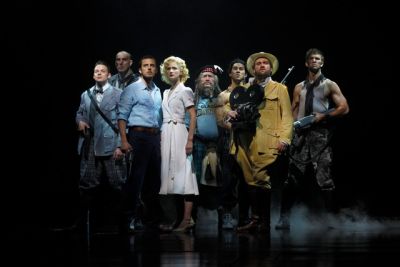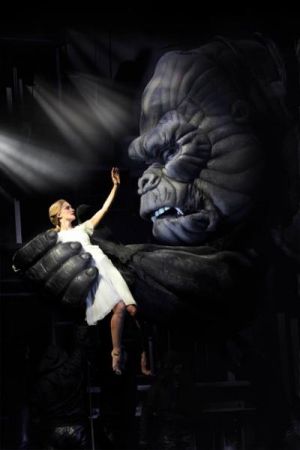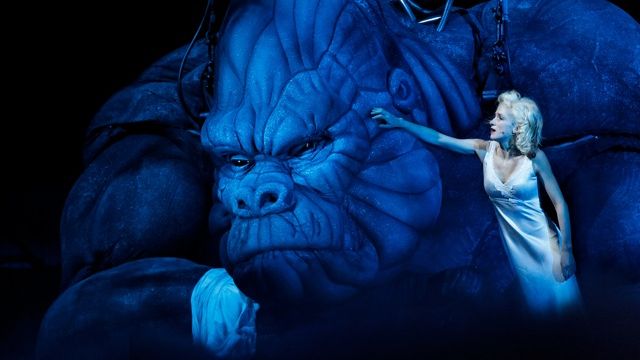King Kong
First the positives:- King Kong is a marvellous spectacle with fabulous costumes. It is a triumph of engineering and technology with an astonishing set (Peter England) and a brilliant lighting plot. Sonny Tilders and his team at Global Creatures deserve a million accolades for his creation of Kong, whose appearance out of the mists of Skull Island brings gasps and deserved applause from the audience. The cast do the best with what they are given and are uniformly good even when wasted. Esther Hannaford is a fine choice as Ann Darrow, despite sublimating her normal gorgeous voice to sing in a heavily affected “Florence and the Machine” style which means we are only able to understand perhaps one in every ten words. The King’s Men, puppeteers and acrobats, are extraordinary, and deserve a standing ovation.
And that’s about it.
There are people who will love this show for all the glitz and excessive glamour at the expense of genuine character development, truthful dialogue and emotional connection. Those people will probably not be Musical Theatre fans/tragics, and in all probability the show needs to be rebranded as a spectacle, and the word musical eliminated from the marketing. We know what Musical Theatre is, and we’re open to seeing it evolve in new ways, whether deconstructed and minimised, or pushed to new levels of sensory overload. But the reality is you can try to re-invent the wheel…but it only runs smoothly if it’s round, not a dodecahedron.

Music (songs) need to come as a natural progression of the narrative and evolve seamlessly from character development. They need to be integral to the storytelling, not stand alone superimposed numbers. This is why the greatest musicals have integrated scores by composers with a singular vision of story and character. This score is a mishmash of styles (and truly abysmal melodies in some cases) tied together with Marius de Vries’ overblown underscore. Some of the songs are nice pop songs, but that’s all they are, songs. They are not part of the storytelling. The 11 O’Clock would-be show-stopper song is “Rise”, and it’s a pretty good song. It is sung by the fabulous Queenie Van De Zandt, who has the role of Cassandra. She’s actually a minor character who is never explained and is not developed, and she is dressed as though she has escaped from Wicked. What a waste of talent. The song is about the growth of cities and the people who come there to build new lives. It is sung while KONG is trapped climbing the Empire state building with Ann…which we don’t see. It pulls focus from Kong’s dilemma and totally stops us feeling any emotions for what’s to come. It kills the ending of the show and would in fact work better at the beginning of the second act which needs a strong number. Do the creatives think that a title “Rise” is enough to link a song to the unseen climb by Kong? Relevance factor for where it currently sits, in musical theatre terms = 0.
The one genuinely touching moment is on the roof, with Ann face to face with Kong. You could feel a true connection and see love in Kong’s eyes even from the back of the stalls. Thank you Sonny Tilders, but Daniel Kramer, where are the tears you promised we would all cry?
 The book itself is the biggest mystery. Credited to Craig Lucas (who gave us the delicious The Light In The Piazza) I cannot imagine that much of Mr Lucas’s book remains or that he is happy to have his name on what does. For the book is the main culprit here. It assumes everyone knows the story in detail and, from the confused murmurings all around me, clearly people don’t, except in broad strokes.
The book itself is the biggest mystery. Credited to Craig Lucas (who gave us the delicious The Light In The Piazza) I cannot imagine that much of Mr Lucas’s book remains or that he is happy to have his name on what does. For the book is the main culprit here. It assumes everyone knows the story in detail and, from the confused murmurings all around me, clearly people don’t, except in broad strokes.
And broad strokes are all there is, without any depth. There’s clunky dialogue in which one line of exposition is meant to replace real development. There are awful jokes which elicit embarrassed chuckles. There are anomalies that are never explained….like an exception being made for Ann to board the ship as no women are allowed….and then a dozen chorus girls on the ship giving her a makeover in a great number which has no place whatsoever and looks like a Lady Ga Ga video clip. The second act starts with Ann telling Jack – back in New York “he said he’ll kill us”. Why? For What? And why not on the trip coming back when presumably they were all on the ship together?
When Ann goes to Kong at the end it’s played as a sacrifice and Ann tells Jack, ‘It’s me or the whole city.’ Why? The one person Kong ISN’T going to harm is Ann…he loves her. There is no retribution for the thoroughly evil Carl, at least none that we see. A rule of all musical storytelling….villains must pay for their villainy. And why would a chorus line tap-dance between a rampaging Gorilla’s legs singing “Get Happy”? It was around that time that the people around me started groaning. By the time Marius de Vries’ requiem (complete with input from Verdi) signals Kong’s death….with dead bodies floating heavenwards (we don’t care about them, they’re unidentified…we have no emotional investment…..so why not at least have Carl as one of them and nail the villain retribution problem?) the same people were snickering behind their hands. As for structure…well, slight though it is, Chitty Chitty Bang Bang knew that the “money shot” was the car flying. And that’s when they brought down the first act curtain. The “money shot” in Kong is his first appearance and him taking Ann. If the first act had ended there it would have left us gasping in awe and talking about “what happens to Ann?” during the interval. It’s a NATURAL cliffhanger. Moreover it would give the second act some form, and built the relationship that currently ends with the first act. In the second act, which is currently a shambles, Kong is a Victim throughout.
If the first act was a Ga Ga video – the second act was my worst Baz Luhrman nightmare. I felt disappointed and then angry that the creatives had not delivered what they had promised, when it could so easily be made better without any extra cost. Let’s face it, you could save an entire African nation with the production costs, and even more depressing is that it will probably make $1billion …which I guess makes it a smash hit in Mister Kramer and Co’s view.
Yes, the technology is great, but where is the heart? Ultimately the excesses are overkill, and what we end up with is a production “full of sound and fury, signifying nothing”.
Coral Drouyn
Photographer: Jeff Busby.
Subscribe to our E-Newsletter, buy our latest print edition or find a Performing Arts book at Book Nook.

